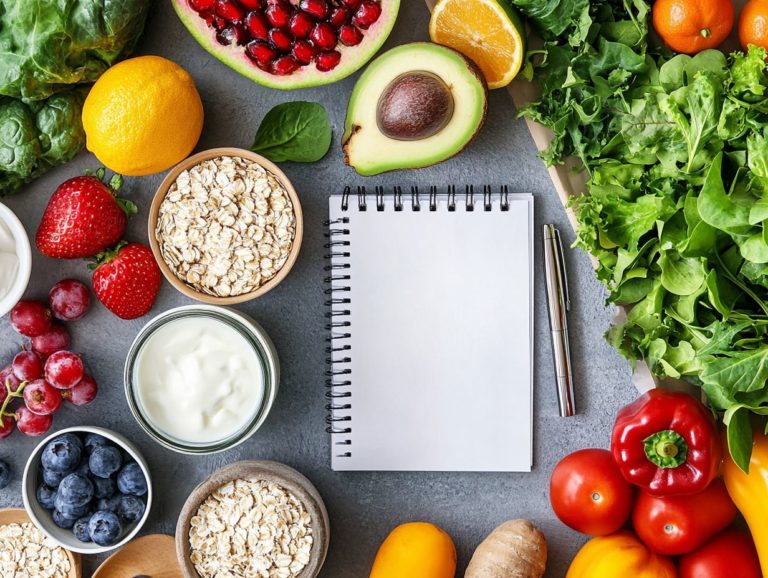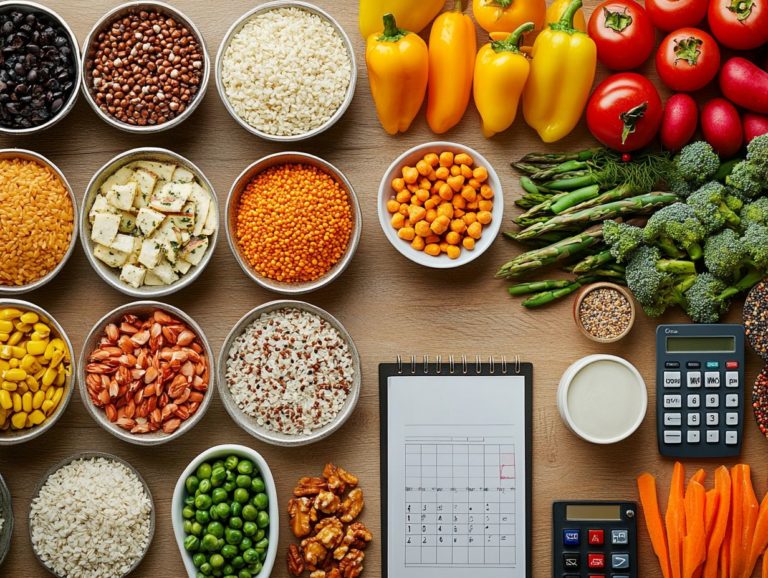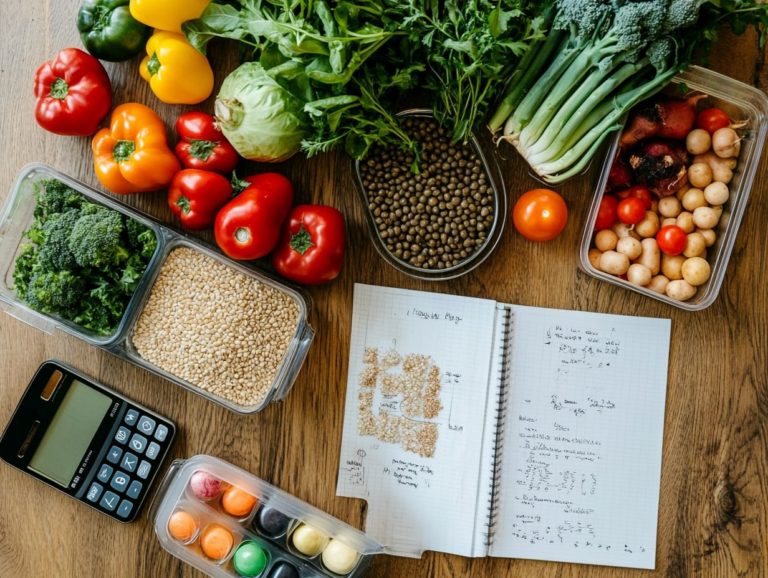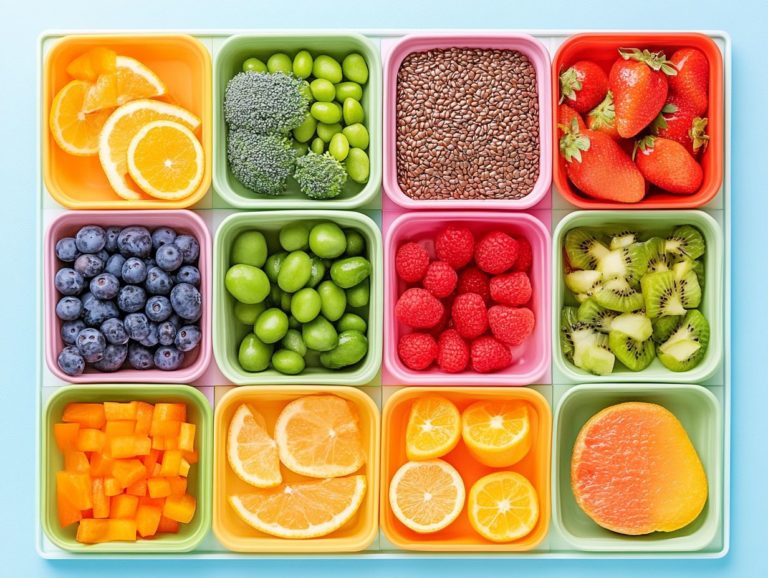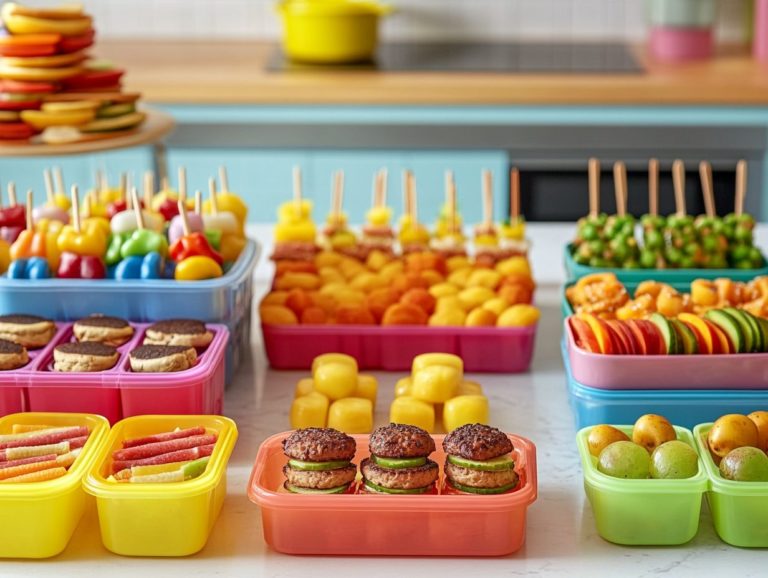The Best Practices for Weekly Meal Planning
Planning your meals for the week can significantly elevate your approach to both cooking and dining.
Not only does it save you precious time and money, but it also encourages healthier choices and ensures nutritional balance. This article delves into the myriad benefits of weekly meal planning, guiding you from the creation of your grocery list to the efficient use of ingredients while accommodating various dietary needs.
You ll discover valuable tools and resources designed to streamline the process. Immerse yourself in this journey and learn how to seamlessly integrate meal planning into your routine!
Contents
- Key Takeaways:
- Benefits of Weekly Meal Planning
- How to Start Weekly Meal Planning
- Tips for Successful Weekly Meal Planning
- Meal Planning for Different Dietary Needs
- Tools and Resources for Meal Planning
- Conclusion
- Frequently Asked Questions
- What are the benefits of weekly meal planning?
- How do I start planning my weekly meals?
- What should I consider when meal planning for the week?
- How can I save money while meal planning?
- How do I ensure variety in my meals while sticking to my weekly plan?
- What if I have a busy week and can’t stick to my meal plan?
Key Takeaways:
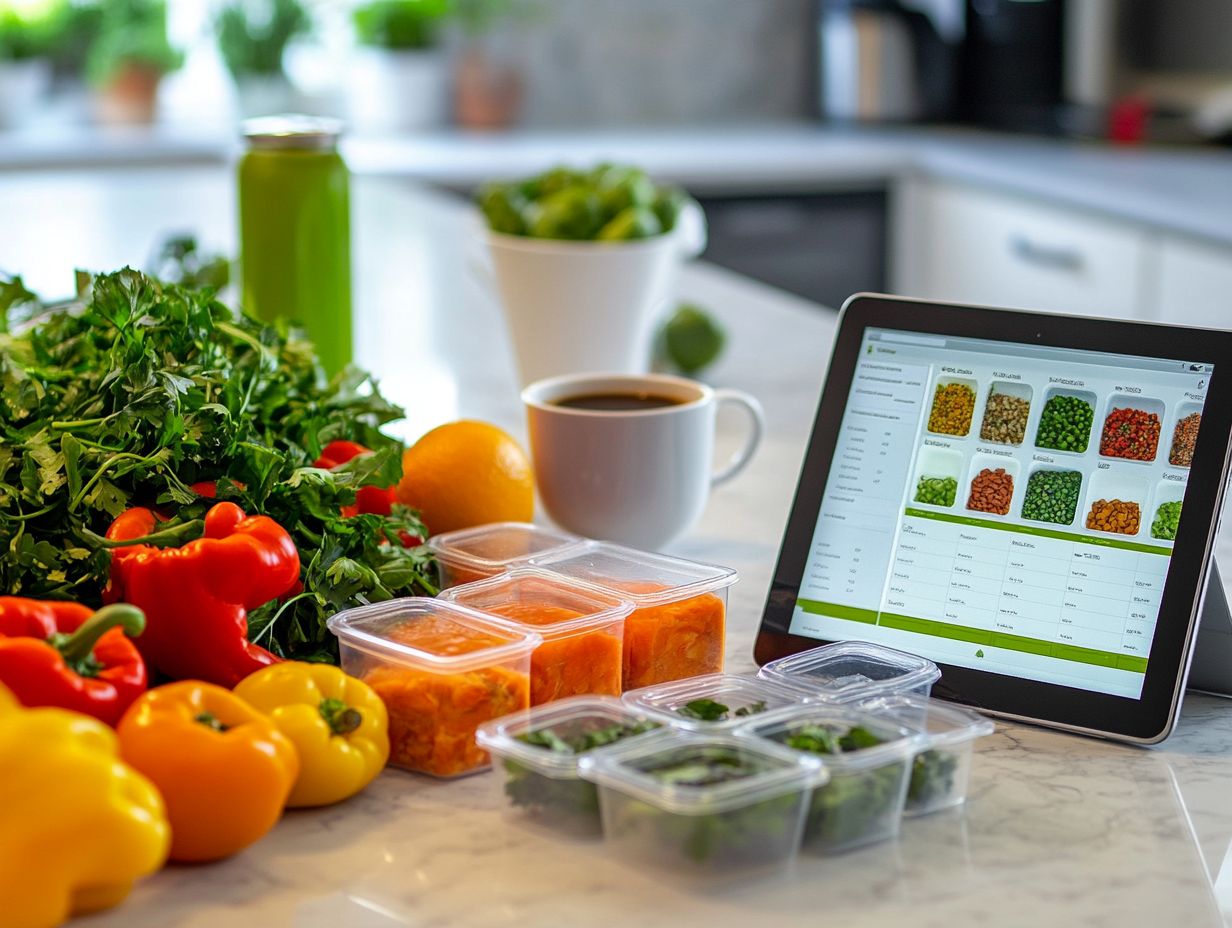
Save time and money by planning meals weekly, reducing unnecessary grocery trips and food waste.
Improve health and nutrition by intentionally choosing balanced and varied meals for the week.
Maximize ingredients and leftovers, and stay flexible when adapting to changes in meal plans.
Benefits of Weekly Meal Planning
Weekly meal planning brings a wealth of advantages your way. You will experience improved time management and notable cost savings.
Additionally, it leads to a marked decrease in food waste.
By crafting a structured grocery list and organizing your meal prep, you can savor healthier meals without the anxiety of last-minute cooking or the temptation of dining out.
Meal planning also sparks creativity, allowing you to explore new recipes while still enjoying family favorites all while keeping a keen eye on your food budget.
This organized approach ensures your kitchen remains well-stocked with essential pantry items that cater to everyone’s dietary preferences.
Time and Money Savings
One of the most significant advantages of meal planning is the remarkable time and money savings it can provide.
By meticulously organizing your meals for the week, you can craft a precise grocery list that focuses solely on the ingredients needed for your planned recipes.
This strategy not only curbs those impulse buys often the culprits behind overspending but also streamlines your shopping trips, making them far more efficient.
Setting a budget upfront enables you to prioritize your purchases and steer clear of tempting yet unnecessary items.
Moreover, meal planning greatly reduces food waste by encouraging you to utilize foods that spoil quickly, like fruits and vegetables, while they re still fresh, benefiting both your wallet and the environment.
Health and Nutrition Benefits
Meal planning plays a pivotal role in enhancing your health and nutrition by enabling you to prepare meals that align perfectly with your dietary goals.
By thoughtfully organizing your meals in advance, you can seamlessly incorporate a variety of nutritious ingredients, ensuring you get a balanced intake of essential vitamins and minerals.
This approach not only sparks creativity in your meal ideas but also simplifies portion control, which is crucial in preventing overeating.
When you engage in meal prep, you set yourself up for success, making it much easier to opt for healthier choices during those hectic weekdays.
By utilizing effective cooking tips and strategies, you can elevate your culinary skills, ensuring that family meals are not only enjoyable but also beneficial, ultimately supporting a healthier lifestyle.
How to Start Weekly Meal Planning
Embarking on a weekly meal planning routine demands a methodical strategy. Begin by gaining a clear insight into your family’s dietary needs and preferences.
Once you have that foundation, craft a comprehensive grocery list to streamline your cooking tasks.
Creating a Plan and Grocery List
Let s make meal planning fun and easy! Creating a comprehensive meal plan and grocery list is essential for effective weekly meal planning, ensuring you have all the necessary ingredients for your chosen meals.
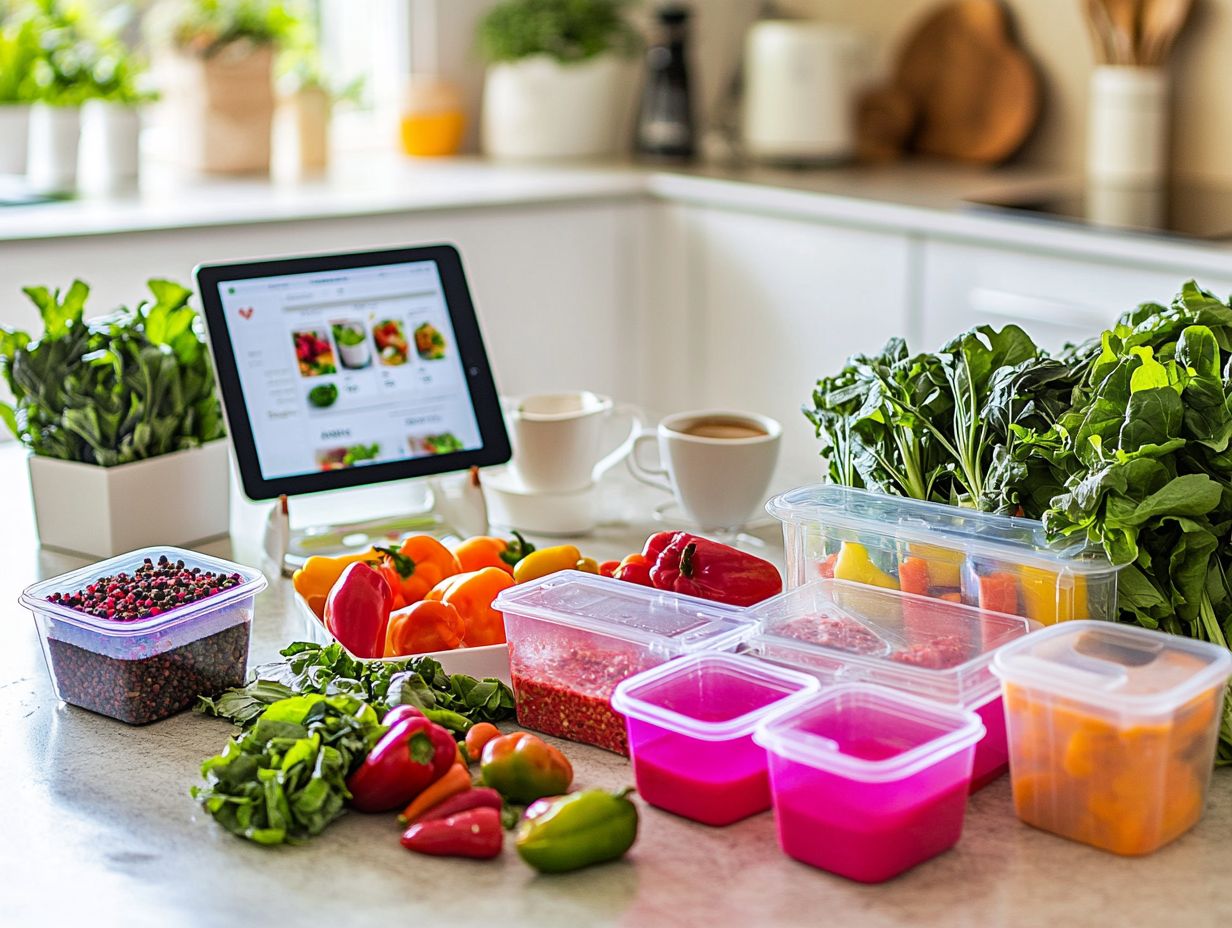
This process typically begins with selecting meal ideas that resonate with your taste buds while keeping in mind nutritional balance and any dietary preferences you may have.
To keep your menu exciting, it s wise to rotate recipes every few weeks. Once you ve settled on your meals, organizing them into a meal prep schedule helps streamline your cooking and reduces the temptation for last-minute takeout.
A well-organized kitchen, paired with pantry staples placed strategically, grants you efficient access to ingredients, making your cooking experience all the more enjoyable.
Incorporating items like grains, legumes, and spices not only adds flavor but can transform simple dishes into something truly satisfying.
Get ready to transform your cooking! Start planning today and watch your cooking transform!
Tips for Successful Weekly Meal Planning
Successful weekly meal planning hinges on your ability to implement tailored strategies that maximize the use of your ingredients, minimize waste, and adapt seamlessly to your family’s schedule.
Maximizing Ingredients and Leftovers
Maximizing ingredients and creatively using leftovers are essential strategies for effective meal prep. These practices help reduce food waste.
When you plan meals that share similar ingredients, you streamline the cooking process. This ensures that every component is used to its fullest potential.
For example, if a recipe calls for roasted vegetables, why not whip up a vibrant stir-fry or a refreshing salad with any leftover produce? It s common to feel overwhelmed by the sheer number of items in your pantry or refrigerator, which often leads to waste.
Adopting an approach that encourages innovative transformations of leftovers tackles this challenge. It also infuses variety into your weekly menu, keeping your meals exciting and flavorful while being conscious of sustainability.
Staying Flexible and Adapting to Changes
Staying flexible with your meal planning enables you to adapt effortlessly to unexpected changes in your family’s schedule and preferences. This adaptability is essential for creating a comfortable environment where everyone feels valued.
One effective strategy is to set aside one day each week for planning balanced meals. Weave in quicker options for those hectic nights when time is short.
Consider having a few go-to recipes that can be prepared in under 30 minutes. Use time management techniques like preparing meals in advance on weekends to free up precious evenings.
This ensures that healthy eating remains a priority, even amidst life’s delightful unpredictabilities.
Meal Planning for Different Dietary Needs
Meal planning can be expertly tailored to accommodate a range of dietary needs, including vegetarian and gluten-free options. This ensures that every family member enjoys balanced and satisfying meals.
Vegetarian, Gluten-Free, and Other Diets

Incorporating vegetarian and gluten-free options into your meal planning enhances your cooking experience. You can enjoy a delightful array of healthy meals that cater to various dietary preferences.
By exploring a diverse range of recipes, you can uncover a multitude of flavors and textures. These not only tantalize your taste buds but also adhere to essential nutritional guidelines.
Focus on creating balanced meals that everyone will love! Include a generous supply of proteins, healthy fats, and carbohydrates, complemented by a vibrant assortment of vegetables.
This thoughtful approach supports your health and highlights various dietary needs. From nourishing grain bowls to colorful salads, prepping meals in advance simplifies your choices and encourages a deeper appreciation for culinary creativity.
Tools and Resources for Meal Planning
Utilizing an array of tools and resources can significantly elevate your meal planning experience. This allows you to effortlessly create and stick to your culinary plans.
Online Meal Planning Services
Online meal planning services provide a sophisticated way to streamline meal preparation. They offer tailored meal ideas and user-friendly grocery lists.
These platforms accommodate a variety of dietary preferences and restrictions, making it easy to discover suitable recipes that align with your needs.
By generating personalized meal plans, they save you valuable time and help reduce food waste by accurately aligning ingredient quantities with your planned meals.
Many of these services integrate with grocery shopping apps, allowing you to transfer your ingredient lists to local stores for quick and efficient shopping.
With features like nutritional analysis and portion control, these services enable you to make informed choices, enhancing your cooking experience while promoting healthier eating habits.
Conclusion
In summary, successful meal planning involves maximizing your ingredients, staying flexible, accommodating dietary needs, and utilizing helpful tools. Start planning today for a healthier, more enjoyable cooking experience!
Cookbooks and Recipe Apps
Cookbooks and recipe apps are essential tools for anyone looking to improve their meal planning and cooking skills. They offer a wide range of recipes that cater to different diets and cooking levels.
Using these resources opens the door to exciting flavors and cuisines, ensuring your weeknight dinners are anything but boring.
Many apps let you customize recipes based on your available ingredients or health goals, leading to healthier eating and inspiring your cooking creativity.
Frequently Asked Questions
What are the benefits of weekly meal planning?
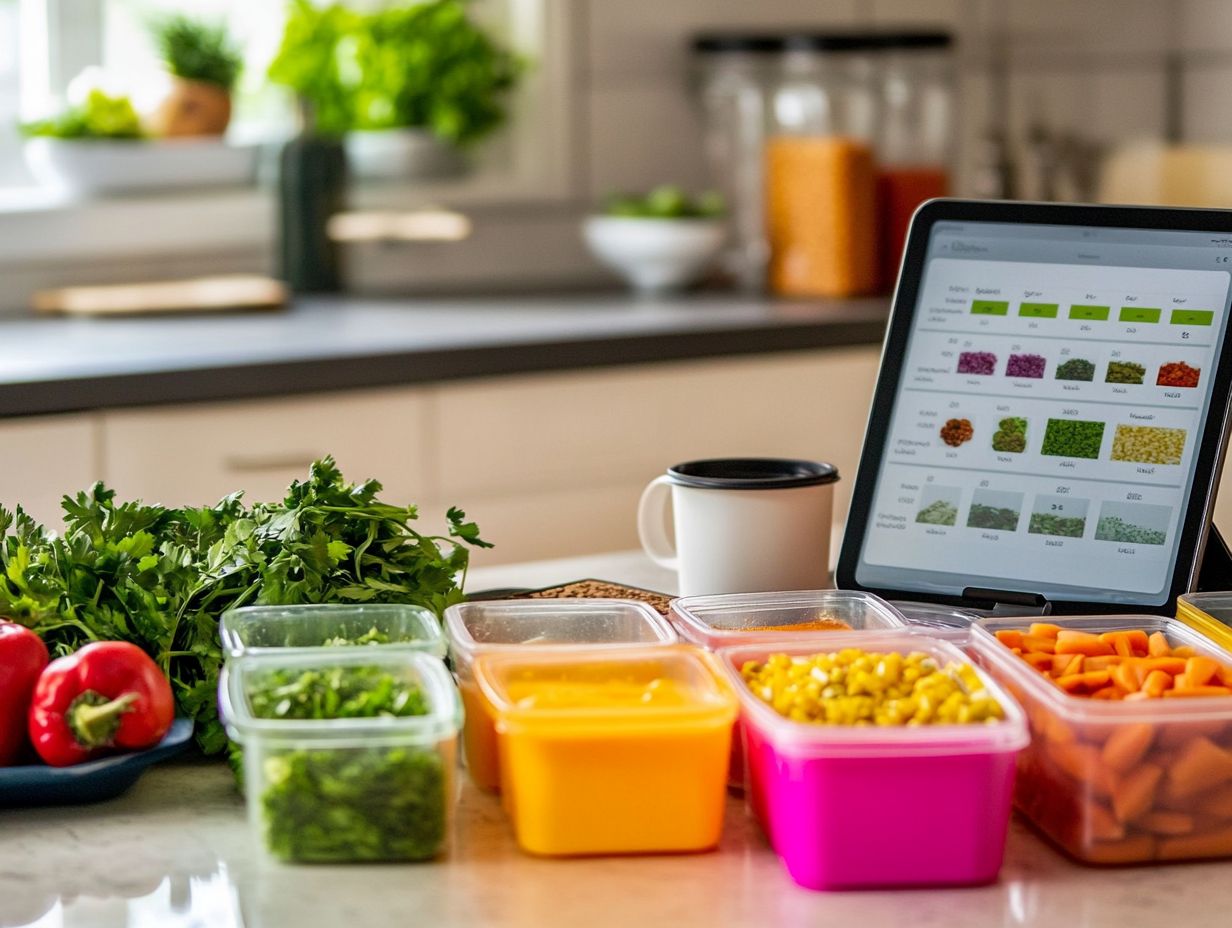
Weekly meal planning saves time and money while reducing food waste. It also helps you maintain a balanced and nutritious diet.
How do I start planning my weekly meals?
Begin by listing your favorite meals. Then, choose a specific day for planning and shopping for ingredients. You can also create theme nights or use online meal planning tools for inspiration.
What should I consider when meal planning for the week?
Think about your schedule, budget, and any dietary restrictions. Also, consider the best time to buy certain foods and plan accordingly.
How can I save money while meal planning?
To save money, buy ingredients in bulk and look for sales or coupons. Plan meals that use similar ingredients to avoid buying unnecessary items. Try to include meatless meals or use more affordable protein sources.
How do I ensure variety in my meals while sticking to my weekly plan?
Include a mix of proteins, grains, fruits, and vegetables in your meal plan. Experiment with new recipes or change the cooking methods for familiar dishes.
What if I have a busy week and can’t stick to my meal plan?
We all have busy weeks, and that’s okay! You can swap meals to another day or use the ingredients in different dishes. Don’t stress; remember to be flexible with your plan.

